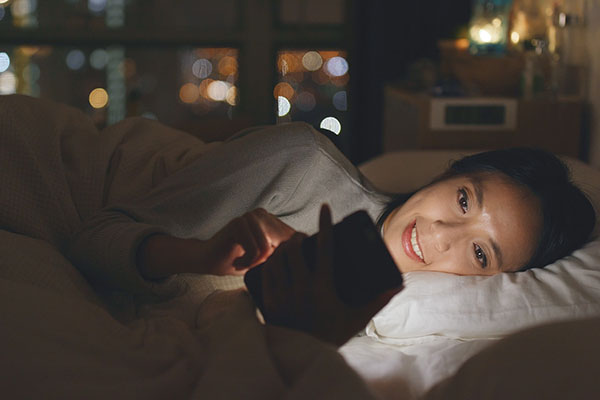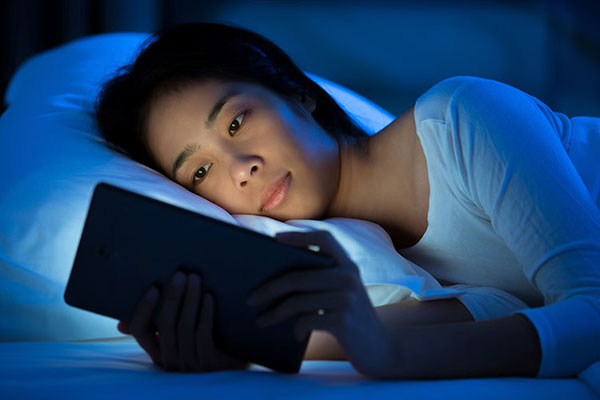Aging effects like smoking, pollution, UV rays, and stress on our skin are well-known, but research has shown that extended exposure to LED screens such as smartphones, tablets, televisions, and computers can also cause damage. These screens emit blue light, which is known as a threat to not only your eyes but also your skin health. Read here as we help you know the effects of blue light on your skin as well as ways to protect yourself.
What is blue light?
As the name suggests, blue light is the spectrum of visible light that appears in the blue to violet category. It is also known as high energy visible (HEV) light, and it is everywhere.
Although many reckon that the blue light comes mainly from LED screens, sunlight is the largest source of blue light to which we are exposed. There are two kinds, including visible light and invisible light. Visible light is the light you can see, like sunlight or the light from your phone. Meanwhile, invisible light cannot be seen with your naked eyes, like UVA and UVB rays. Among other things, this radiation makes you burn and is damaging your health.

How does blue light affect your skin?
In the solar spectrum, blue light, which is pretty close to ultraviolet light, has a wavelength of around 400 to 700 nanometers. In fact, a wavelength of fewer than 450 nanometers leads to premature skin aging. That is because blue light can penetrate deep into the skin and then induce oxidative stress, resulting in a degeneration of cell membranes and a decrease in the production of elastin and collagen.
In 2018, French researchers from a cosmetics ingredients company, named Gattefossé, found that if skin cells were exposed to artificial blue light for 6 hours a day over 11 months, the structure of their cells was changed. And they concluded that constant exposure to this light might lead to premature aging of the skin and probable oxidative stress.
Recently, a 2020 research showed prolonged exposure to blue light might enhance the amount of DNA damage, tissue and cell death and injury, skin barrier damage, photo-aging, and eye damage. It is because both UVA and UVB rays contribute to increasing the aging process by damaging cells. Badly, they disrupt skin barrier function and boost skin pigmentation [1].
Another indirect effect of blue light is its intervention with the body’s natural circadian rhythm. This light blocks the sleep hormone melatonin and tends to activate the individual who is exposed to it. That is why looking at digital screens till late in the night will interfere with your natural body clock and lead to sleep disorders. It is well-known that sleep deprivation might result in skin aging and the breakdown of collagen.
An interesting thing in this part is that low-level blue light therapy has been used to deal with acne and increase wound healing. But too much of a good thing may be a bad thing. That means the more time you expose to the blue light, the worse off your skin might be.
How to protect your skin from blue light?
Diminishing your exposure to blue light is the easiest way to save your skin from unexpected side effects. But this might be easier said than done these days because smartphones, laptops, and other digital devices are a prerequisite in our daily routine.
To help you reduce your exposure to blue light, we suggest some practical tips.
Limit screen time
Again, one of the sure ways to protect your skin against blue light is to limit your exposure to it. Listen to music, read a book, or go on for a walk (remember to wear sunscreen) instead of shopping online or scrolling on social media. But if you have to use digital devices during work hours, try to prevent you from using them for nonessential purposes or consider using blue light filters on your devices or changing to night mode to lower the light emitted by the screen.
Wear sunblock
As mentioned above, the sun is the main source of blue light. So, the very best defense against this light is to use sunscreen. And a broad-spectrum sunscreen with zinc oxide can filter blue light effectively.
Apply sunscreen daily, even when you are at home or in the winter because your skin needs protection from sun exposure, the UV rays to digital devices. Since not all sunscreens include HEV protection, it is fine to use one with a minimum of SPF 30 and plenty of antioxidants ingredients.

Avail complexion makeup
Like sunscreen, makeup can be a vital tool for protecting your skin against blue light. The majority of complexion makeup, including liquid/powder foundation, moisturizer, or concealer, uses iron oxides to get its pigment. Also, wearing BB cream is an ideal way to lower the effects of blue light by 80% because it works as a skin barrier.
Load up on antioxidants
Blue light has been shown to cause oxidative stress in the skin. And the important thing to prevent it is to load up on topical antioxidants – both inside and outside.
It should be noted that you should incorporate ingredients, such as vitamin C, phloretin, and ferulic acid into your skincare routine to prevent free radicals and pigmentation. Also, a colorful diet rich in antioxidants helps neutralize free radicals and makes the skin firm and elastic.
Strengthen the skin barrier with niacinamide
The next ingredient that can protect the skin from blue light is niacinamide. It has been shown to even out skin complexion and aid in helping a strong skin barrier. That is because its mechanism might lower the process of reactive oxygen species, a harmful process that might destroy skin proteins and lipids. Also, it helps promote the repair of DNA damage in human keratinocytes and human skin.
Revel in a nighttime skincare routine
While your skin is exposed to dirt, grime, UV rays, and pollutants during the day, your skin needs time to undo the damage, repair, and create new cells at night. By following a night care regime, you support your skin rejuvenating itself better and faster. At night, the skin’s cells recreate quicker due to the increased blood flood to the skin. So, if you use cream and serum rich in hyaluronic acid, your skin will be nourished well and become hydrated, firm, and supple.
To sum up
The effects of blue light can result in skin issues, such as hyperpigmentation and premature signs of aging. But luckily, there are tips you can take advantage of to diminish its damaging effects. Be mindful of your screen time, consume a wholesome diet, wear a broad-spectrum sunblock, and use suitable products to protect your skin against blue light.
Sharing is caring!
- Related post: Top 10 Anti-Aging Ingredients You Should Not Miss



